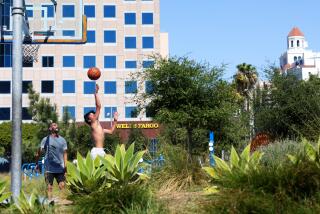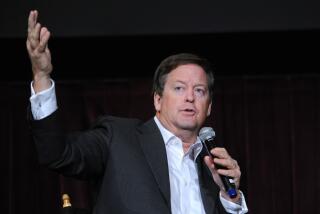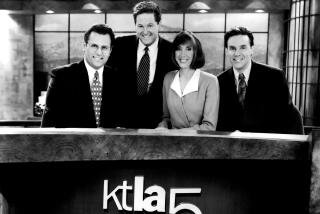Public Radio Covers World Business From Long Beach
At first meeting, Jim Russell, one of the creators of public radio’s enduring “All Things Considered,” seems a bit like a character out of another one-time public-radio staple, “A Prairie Home Companion.”
Looking comfortable in a plaid shirt and brown slacks, the droll, barrel-shaped Russell showed a visitor around the home of his latest venture, saying, “I do so not out of a sense of pride but out of a sense of astonishment.”
He was referring to the small-potatoes look of the place: Long Beach radio station KLON-FM (88.1), which shares space in a small office complex with the Merry Maids cleaning service, among other businesses.
Appearances can be deceiving. Russell, 42, has come here to launch American Public Radio’s first West Coast production center.
The first result of that effort, a half-hour business news show called “Marketplace,” has been on the air for five months, attracting an impressive group of more than 70 regular contributors, including “In Search of Excellence” co-author Tom Peters, “Golden Fleece Awards” founder and former Sen. William Proxmire and correspondents around the globe.
On many of the 93 public radio stations carrying the show, it runs as a companion piece to “All Things Considered.” It’s aired in all of the 26 largest U.S. markets, including four local FM stations--KLON, which airs it weekdays at 6 p.m.; KCRW (89.9) in Santa Monica (weekdays at 3:30 p.m.), and KUSC (91.5) in Los Angeles and KCPB (91.1) in Thousand Oaks (weekdays at 5 p.m.).
Russell is the creator and executive producer of the program, which is anchored by former San Francisco video producer Michael Creedman.
Most nationally broadcast business shows emanate from New York, but APR chose Long Beach as the base for “Marketplace” because, APR executive vice president Eric Friesen said, “It seemed to us that you in Southern California have a better sense of where business is now and in the future than some of our Eastern counterparts, who still find it hard to get out of the old mode of thinking that business begins and ends on Wall Street.
“We felt that we should bring the program to a place where producers as well as the business community understand that business is now a globally interlinked affair.”
That attitude comes naturally to Russell. The son of a CIA agent, he grew up in Italy, Greece and Pakistan and later spent time in Vietnam and Cambodia as a UPI reporter. As a consequence of all those years spent overseas, he said, he tends to look at the United States “through foreign eyes.”
He was wooed here from his position as general manager of the innovative Minneapolis public television station KTCA, which was doing satellite hook-ups with the Soviet Union before glasnost made such undertakings fashionable.
After 10 years in the TV business, Russell said, “There’s something very refreshing and pure about radio. You don’t need a whole lot of fancy stuff.” To cover the world from Long Beach, he said, “All you need is an editorial approach and . . . telephones.”
On “Marketplace,” that approach is “cultural detective work,” Russell said. “What are people thinking, how are they acting, and I don’t think the American (business news) media does a very good job of that at all. They’re so busy reporting statistics and data.”
When a friend asked Russell how he planned to cover the East Coast financial markets from Long Beach, he responded that he planned to cover them “like the colonies they are.”
“I like Apple Computer’s saying once that they were the computer for the rest of us,” he said. “Well, this is the business show for the rest of us. I am not interested in doing a business show that aims at CEOs, because they don’t need me. And if I stultify, if I narrow and give them what they want, everybody else gets left out.”
To “tap the country,” a goal Russell mentions often, “Marketplace” has a daily feature focusing on leading business stories in newspapers around the country. The show also regularly interviews local newspaper editors.
Foreign coverage, however, is “sort of Point One,” in Russell’s priorities for the show, he said.
A slew of British correspondents, including the senior economic correspondent for the BBC World Service, the Asian bureau chief for the Economist, and reporters from the Observer and the Financial Times, help anchor various points of the world for the show.
Foreign editor George Lewinski, recruited from the Canadian Broadcasting System, credited the British media with being “generally more interested in foreign news” than the Canadian or U.S. media, which accounts for the preponderance of British reporters.
To report on Eastern Europe, “Marketplace” has a former senior correspondent for Hungarian state television, along with a Polish national. “I think Eastern Europe is very important and totally uncovered (by most media),” Russell said. “It’s important for us to realize that there is not a monolithic communism.”
As for the other shows that Russell was hired to create for APR here, “It’s wide open and it’s not necessarily business or even news,” he said. “I’m interested in comedy, I’m interested in performance, I’m interested in multicultural things. I’m interested in getting stuff going with the Australians, the Chinese, the Japanese.
“And I guess I have what may sound like incredible chutzpah to think that why should this small, budding operation be doing that when there are bigger giants to do it. And the answer is: They don’t seem to want to. They don’t seem to know how. They seem to be quite satisfied delivering the same old stuff.”
More to Read
Sign up for Essential California
The most important California stories and recommendations in your inbox every morning.
You may occasionally receive promotional content from the Los Angeles Times.










